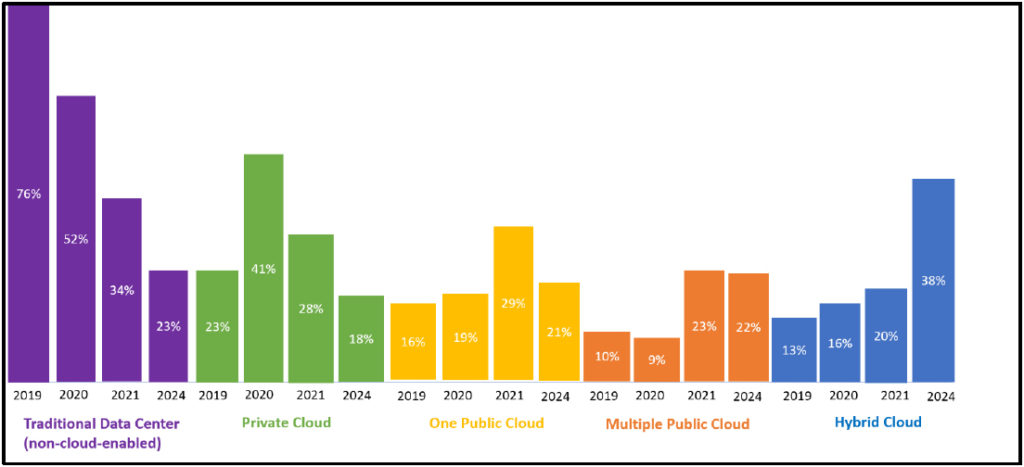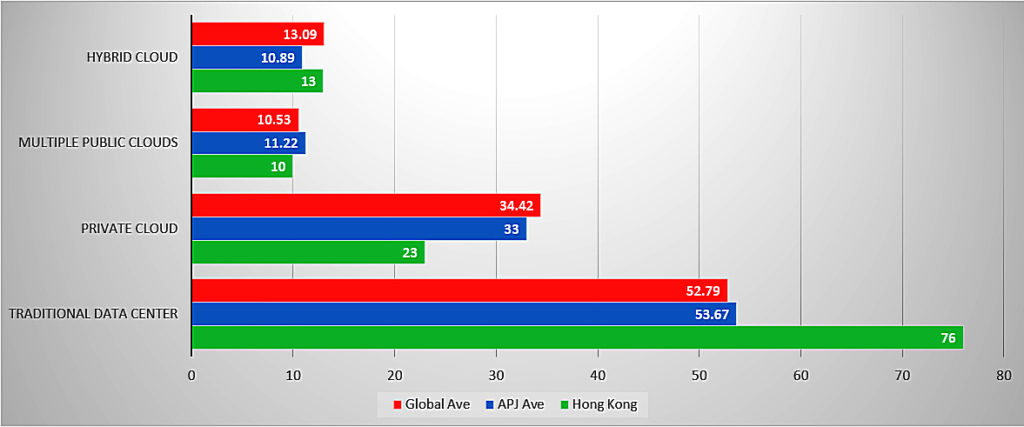Hong Kong is planning a huge shift from traditional IT datacentres to hybrid clouds over the next five years, following same general deployment trends in global and Asia Pacific region. But rather than going direct from on-prem to hybrid cloud, the survey claims that Hong Kong is taking a “private cloud first” approach – a strategy that doesn’t make sense.
The Enterprise Cloud Index report, which measures enterprise progress on adopting private, hybrid and public clouds, was conducted by Vanson Bourne on behalf of Nutanix across 2,650 IT decision makers in 24 countries including Hong Kong.
Times are changing (for Hong Kong) – almost
Study respondents indicated an aggressive shift away from traditional datacentres, where Hong Kong remains heavily dependent.
The report revealed what we already know: Hong Kong has one of the highest penetrations of traditional datacentres in Asia Pacific and Japan, with 76% of local respondents reporting non-cloud-enabled datacentres as their current primary deployment model.
Arguably the tight control by the city’s defector central bank, the Hong Kong Monetary Authority, has contributed to the city having one of the most conservative financial regimes in the world.
Scratching my head
When it comes to the preferred future model, Hong Kong is planning a “private cloud first” approach over the next five years, with a stated plan to migrate investment in hybrid cloud.
According to the report, while public cloud investment will remain relatively flat over the coming year, planned investment in private cloud is predicted to nearly double, while traditional datacentres look set to plummet 37.5% over the same time period.
Going for hybrid
Hong Kong respondents to the survey plan to triple their hybrid cloud investment, from 13% to 38% over the next few years. while almost 70% of those surveyed locally agree or strongly agree that hybrid cloud is the ideal cloud model for their IT environment.
The major reason cited for this shift was the flexibility of hybrid cloud to match workloads to ever-changing environments – at an affordable cost.

Source: Enterprise Cloud Index, 2019
Hong Kong respondents also considered the hybrid model to be more secure than other solutions, including traditional datacentres.
Looking ahead 2020-2025
However, despite local enterprises sharing the same positive attitudes towards hybrid cloud as the rest of the world, Hong Kong still lags the global average in terms of planned infrastructure deployment over the next 5 years.

Source: Enterprise Cloud Index, 2019
Other concerns (Hong Kong vs. other markets)
Security remains the biggest factor impacting enterprises’ future cloud strategies. Nearly half of Hong Kong respondents (47%) and over half of global respondents (60%) said that the state of security among clouds would have the biggest influence on their cloud deployment plans going forward.
Performance is a top variable for Hong Kong enterprises in determining where an enterprise runs a given workload (19%), while data security and compliance only comes in second (17%). Total cost of ownership (16%) also makes it to the top 3 factors in deciding where to put workloads.
Hong Kong’s plans for collecting and analysing data at the edge play a significant role in its cloud computing decisions, ranking it higher (45%) than all other countries. This relates to how Hong Kong is the least likely to outsource compute and storage infrastructure (39%) than any other country globally.
Hong Kong is also ranked second lowest for outsourcing analytics and big data platforms.
Hong Kong is open to the idea of using hosted or managed cloud services to fill in the IT skills gap. More than half of Hong Kong companies (51%) agreed that they lack internal IT skills required to meet business demand, and 65% agreed that leveraging a hosted/managed cloud service would help them reduce the size of their internal IT staff.
Hong Kong is a clear outlier in viewing artificial intelligence/machine learning as negatively impacting their business, with 15% of Hong Kong respondents agreeing this is so. This may be partially due to IT feeling they are not ready: when asked to rank where IT skills were lacking, they ranked AI at the top of the list (36%).
“As organizations continue to grapple with complex digital transformation initiatives, flexibility and security remain critical components to enable seamless and reliable cloud adoption,” said Edward Yeung, managing director of Hong Kong and Taiwan, for Nutanix.




